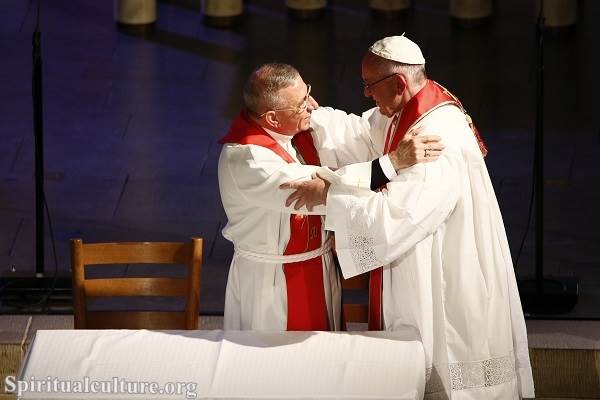The Protestant tradition stands firmly on the foundation of Scripture. But what does it mean to say the Bible is “authoritative”? Why is it held above all other voices, traditions, or experiences? And how has this conviction shaped not only theology, but the very heart of Christian living?
This article explores what Protestants believe about the Bible’s authority, where that belief came from, and how it continues to form, challenge, and inspire believers around the world.
A Faith Rooted in Scripture
The Protestant Reformation was, at its core, a return to the Word. While it was sparked by theological controversies and ecclesiastical corruption, its deepest cry was sola Scriptura — “Scripture alone.”
This was not a call to discard all tradition, but a declaration that only the Bible is infallible — that it stands as the final, trustworthy authority for faith and life.
From this truth, everything else flowed: worship, doctrine, ethics, and mission.
But what does this mean in practice? And why does it matter so much?
The Origins of Biblical Authority in Protestantism
Martin Luther and Sola Scriptura
The spark of the Protestant Reformation is often traced to Martin Luther’s challenge to the Roman Catholic Church, especially its reliance on Church authority, papal decrees, and sacred tradition alongside Scripture.
At the Diet of Worms in 1521, Luther famously declared:
“Unless I am convinced by Scripture and plain reason… I cannot and will not recant anything, for to go against conscience is neither right nor safe. Here I stand, I can do no other. God help me.”
This moment crystallized the Protestant belief:
Scripture stands above councils, popes, and traditions.
It is the norming norm — the authority by which all other claims must be judged.
From Tradition to Text
Before the Reformation, the Church had taught that tradition and Scripture were twin sources of authority, guided by the Magisterium (the teaching office of the Church). The Reformers rejected this dual-source model, asserting that:
- The Bible interprets itself.
- The Holy Spirit guides believers into truth.
- All necessary doctrine is contained clearly within Scripture.
This did not mean discarding Church history or theologians, but rather holding all teachings accountable to the text of Scripture itself.
What Does It Mean That the Bible Is “Authoritative”?
Inspired by God
Protestants believe that the Bible is “God-breathed.”
As Paul wrote to Timothy:
“All Scripture is God-breathed and is useful for teaching, rebuking, correcting and training in righteousness.”
(2 Timothy 3:16, NIV)
This doesn’t mean the Bible fell from heaven, word-for-word, without human involvement. Rather, God spoke through human authors — preserving their personalities, styles, and contexts — to communicate His unchanging truth.
This divine inspiration gives the Bible its authority:
It is not just wise, but true.
Not just helpful, but binding.
Clear, Sufficient, and Necessary
Protestant theology holds to three vital truths about Scripture:
- Clarity (perspicuity): The Bible can be understood, especially in its central message of salvation.
- Sufficiency: Everything needed for salvation and godly living is in Scripture.
- Necessity: Without Scripture, we could not know God’s will or saving truth.
These principles mean the Bible isn’t just an ancient document — it is God’s living word to every generation.
Scripture in the Life of the Church
Preaching and Teaching
In Protestant churches, the sermon is typically the central feature of worship. Why? Because the preached Word is how God speaks today.
This reflects Romans 10:17:
“So faith comes from hearing, and hearing through the word of Christ.”
Protestant ministers are not seen as spiritual authorities by virtue of their office, but servants of the Word — tasked with faithfully interpreting and applying Scripture.
Worship Shaped by the Word
Protestant liturgy — whether formal or free-flowing — is meant to be saturated in Scripture:
- Psalms and biblical hymns are sung.
- The Bible is read aloud.
- Prayers are informed by biblical language.
- The sacraments (Baptism and the Lord’s Supper) are practiced according to scriptural instruction.
Everything is shaped by the conviction: God speaks, and we respond.
Discipleship and Devotion
For Protestants, reading the Bible is not just for clergy or scholars. Every believer is encouraged — even expected — to:
- Read the Scriptures daily.
- Meditate on its truth.
- Test all teachings against the Word.
- Grow in wisdom and obedience through its message.
This reflects the “priesthood of all believers,” where each Christian has direct access to God’s Word and Spirit.
Challenges to Biblical Authority Today
The Rise of Relativism
In a culture of “your truth” and “my truth,” the idea of a single, binding authority is countercultural. Many wrestle with the Bible’s claims on morality, sexuality, identity, and truth itself.
Some ask:
- Isn’t the Bible outdated?
- Can it really speak to modern issues?
- Isn’t interpretation just subjective?
While Protestants differ on how to interpret certain passages, the core remains:
The Bible speaks, and it speaks with authority.
Not because culture agrees with it, but because God has spoken.
The Temptation of Experience over Scripture
Even within the church, experience, emotion, or popular opinion can begin to overshadow the Bible. While experiences matter, they must be tested by Scripture — not the other way around.
The Protestant conviction is not anti-emotion, but anchored truth:
Let Scripture interpret your feelings, not your feelings interpret Scripture.
The Bible as a Living Word
Not a Rulebook, but a Revelation
To call the Bible “authoritative” is not to reduce it to a cold list of commands. The Bible is a story, a revelation of God’s heart — His rescue, His covenant, His Son.
It speaks truth, but also beauty.
It confronts sin, but also invites grace.
As Hebrews 4:12 declares:
“For the word of God is living and active, sharper than any double-edged sword… it judges the thoughts and attitudes of the heart.”
The authority of Scripture is not oppressive — it is liberating. It doesn’t crush the soul; it awakens it.
Christ at the Center
All Protestant interpretations of Scripture are — or should be — Christ-centered.
As Jesus said:
“You search the Scriptures because you think that in them you have eternal life; and it is they that bear witness about me.”
(John 5:39, ESV)
To uphold the Bible’s authority is not to idolize a book, but to treasure the One it reveals.
Reflect and Reimagine
The authority of the Bible in Protestant belief is not merely a theological slogan — it is a living conviction. It means trusting that God has spoken, that His Word is enough, and that our lives are to be shaped by it.
In a world of shifting values, the Bible stands like a lighthouse — steady, illuminating, and directing us to safe harbor.
So consider:
- Do you read the Bible expecting God to speak?
- Do you let it shape your thoughts, habits, and hopes?
- Are there areas where tradition or personal opinion have taken precedence over Scripture?
Return to the Word. Not as a duty, but as a delight. Not as a relic, but as revelation.
For in its pages, God still whispers, commands, comforts, and calls.
And in the center of it all, we find Jesus — the Word made flesh.
“The grass withers, the flower fades, but the word of our God will stand forever.”
— Isaiah 40:8



